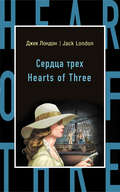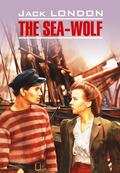
Джек Лондон
On the Makaloa Mat/Island Tales
In brief, he was a wealthy man's son who had made good. His father's million he inherited he had increased to ten millions, at the same time keeping up his father's benefactions and endowments and overshadowing them with his own.
But there was still more to him. A ten years' widower, without issue, he was the most eligible and most pathetically sought-after marriageable man in all Hawaii. A clean-and-strong-featured brunette, tall, slenderly graceful, with the lean runner's stomach, always fit as a fiddle, a distinguished figure in any group, the greying of hair over his temples (in juxtaposition to his young- textured skin and bright vital eyes) made him appear even more distinguished. Despite the social demands upon his time, and despite his many committee meetings, and meetings of boards of directors and political conferences, he yet found time and space to captain the Lakanaii polo team to more than occasional victory, and on his own island of Lakanaii vied with the Baldwins of Maui in the breeding and importing of polo ponies.
Given a markedly strong and vital man and woman, when a second equally markedly strong and vital man enters the scene, the peril of a markedly strong and vital triangle of tragedy becomes imminent. Indeed, such a triangle of tragedy may be described, in the terminology of the flat-floor folk, as "super" and "impossible." Perhaps, since within himself originated the desire and the daring, it was Sonny Grandison who first was conscious of the situation, although he had to be quick to anticipate the sensing intuition of a woman like Ida Barton. At any rate, and undebatable, the last of the three to attain awareness was Lee Barton, who promptly laughed away what was impossible to laugh away.
His first awareness, he quickly saw, was so belated that half his hosts and hostesses were already aware. Casting back, he realized that for some time any affair to which he and his wife were invited found Sonny Grandison likewise invited. Wherever the two had been, the three had been. To Kahuku or to Haleiwa, to Ahuimanu, or to Kaneohe for the coral gardens, or to Koko Head for a picnicking and a swimming, somehow it invariably happened that Ida rode in Sonny's car or that both rode in somebody's car. Dances, luaus, dinners, and outings were all one; the three of them were there.
Having become aware, Lee Barton could not fail to register Ida's note of happiness ever rising when in the same company with Sonny Grandison, and her willingness to ride in the same cars with him, to dance with him, or to sit out dances with him. Most convincing of all, was Sonny Grandison himself. Forty-one, strong, experienced, his face could no more conceal what he felt than could be concealed a lad of twenty's ordinary lad's love. Despite the control and restraint of forty years, he could no more mask his soul with his face than could Lee Barton, of equal years, fail to read that soul through so transparent a face. And often, to other women, talking, when the topic of Sonny came up, Lee Barton heard Ida express her fondness for Sonny, or her almost too-eloquent appreciation of his polo-playing, his work in the world, and his general all-rightness of achievement.
About Sonny's state of mind and heart Lee had no doubt. It was patent enough for the world to read. But how about Ida, his own dozen-years' wife of a glorious love-match? He knew that woman, ever the mysterious sex, was capable any time of unguessed mystery. Did her frank comradeliness with Grandison token merely frank comradeliness and childhood contacts continued and recrudesced into adult years? or did it hide, in woman's subtler and more secretive ways, a beat of heart and return of feeling that might even out- balance what Sonny's face advertised?
Lee Barton was not happy. A dozen years of utmost and post-nuptial possession of his wife had proved to him, so far as he was concerned, that she was his one woman in the world, and that the woman was unborn, much less unglimpsed, who could for a moment compete with her in his heart, his soul, and his brain. Impossible of existence was the woman who could lure him away from her, much less over-bid her in the myriad, continual satisfactions she rendered him.
Was this, then, he asked himself, the dreaded contingency of all fond Benedicts, to be her first "affair?" He tormented himself with the ever iterant query, and, to the astonishment of the reformed Kohala poker crowd of wise and middle-aged youngsters as well as to the reward of the keen scrutiny of the dinner-giving and dinner-attending women, he began to drink King William instead of orange juice, to bully up the poker limit, to drive of nights his own car more than rather recklessly over the Pali and Diamond Head roads, and, ere dinner or lunch or after, to take more than an average man's due of old-fashioned cocktails and Scotch highs.
All the years of their marriage she had been ever complaisant toward him in his card-playing. This complaisance, to him, had become habitual. But now that doubt had arisen, it seemed to him that he noted an eagerness in her countenancing of his poker parties. Another point he could not avoid noting was that Sonny Grandison was missed by the poker and bridge crowds. He seemed to be too busy. Now where was Sonny, while he, Lee Barton, was playing? Surely not always at committee and boards of directors meetings. Lee Barton made sure of this. He easily learned that at such times Sonny was more than usually wherever Ida chanced to be – at dances, or dinners, or moonlight swimming parties, or, the very afternoon he had flatly pleaded rush of affairs as an excuse not to join Lee and Langhorne Jones and Jack Holstein in a bridge battle at the Pacific Club – that afternoon he had played bridge at Dora Niles' home with three women, one of whom was Ida.
Returning, once, from an afternoon's inspection of the great dry- dock building at Pearl Harbour, Lee Barton, driving his machine against time, in order to have time to dress for dinner, passed Sonny's car; and Sonny's one passenger, whom he was taking home, was Ida. One night, a week later, during which interval he had played no cards, he came home at eleven from a stag dinner at the University Club, just preceding Ida's return from the Alstone poi supper and dance. And Sonny had driven her home. Major Fanklin and his wife had first been dropped off by them, they mentioned, at Fort Shafter, on the other side of town and miles away from the beach.
Lee Barton, after all mere human man, as a human man unfailingly meeting Sonny in all friendliness, suffered poignantly in secret. Not even Ida dreamed that he suffered; and she went her merry, careless, laughing way, secure in her own heart, although a trifle perplexed at her husband's increase in number of pre-dinner cocktails.
Apparently, as always, she had access to almost all of him; but now she did not have access to his unguessable torment, nor to the long parallel columns of mental book-keeping running their totalling balances from moment to moment, day and night, in his brain. In one column were her undoubtable spontaneous expressions of her usual love and care for him, her many acts of comfort-serving and of advice-asking and advice-obeying. In another column, in which the items increasingly were entered, were her expressions and acts which he could not but classify as dubious. Were they what they seemed? Or were they of duplicity compounded, whether deliberately or unconsciously? The third column, longest of all, totalling most in human heart-appraisements, was filled with items relating directly or indirectly to her and Sonny Grandison. Lee Barton did not deliberately do this book-keeping. He could not help it. He would have liked to avoid it. But in his fairly ordered mind the items of entry, of themselves and quite beyond will on his part, took their places automatically in their respective columns.
In his distortion of vision, magnifying apparently trivial detail which half the time he felt he magnified, he had recourse to MacIlwaine, to whom he had once rendered a very considerable service. MacIlwaine was chief of detectives. "Is Sonny Grandison a womaning man?" Barton had demanded. MacIlwaine had said nothing. "Then he is a womaning man," had been Barton's declaration. And still the chief of detectives had said nothing.
Briefly afterward, ere he destroyed it as so much dynamite, Lee Barton went over the written report. Not bad, not really bad, was the summarization; but not too good after the death of his wife ten years before. That had been a love-match almost notorious in Honolulu society, because of the completeness of infatuation, not only before, but after marriage, and up to her tragic death when her horse fell with her a thousand feet off Nahiku Trail. And not for a long time afterward, MacIlwaine stated, had Grandison been guilty of interest in any woman. And whatever it was, it had been unvaryingly decent. Never a hint of gossip or scandal; and the entire community had come to accept that he was a one-woman man, and would never marry again. What small affairs MacIlwaine had jotted down he insisted that Sonny Grandison did not dream were known by another person outside the principals themselves.
Barton glanced hurriedly, almost shamedly, at the several names and incidents, and knew surprise ere he committed the document to the flames. At any rate, Sonny had been most discreet. As he stared at the ashes, Barton pondered how much of his own younger life, from his bachelor days, resided in old MacIlwaine's keeping. Next, Barton found himself blushing, to himself, at himself. If MacIlwaine knew so much of the private lives of community figures, then had not he, her husband and protector and shielder, planted in MacIlwaine's brain a suspicion of Ida?
"Anything on your mind?" Lee asked his wife that evening, as he stood holding her wrap while she put the last touches to her dressing.
This was in line with their old and successful compact of frankness, and he wondered, while he waited her answer, why he had refrained so long from asking her.
"No," she smiled. "Nothing particular. Afterwards.. perhaps.. "
She became absorbed in gazing at herself in the mirror, while she dabbed some powder on her nose and dabbed it off again.
"You know my way, Lee," she added, after the pause. "It takes me time to gather things together in my own way – when there are things to gather; but when I do, you always get them. And often there's nothing in them after all, I find, and so you are saved the nuisance of them."
She held out her arms for him to place the wrap about her – her valiant little arms that were so wise and steel-like in battling with the breakers, and that yet were such just mere-woman's arms, round and warm and white, delicious as a woman's arms should be, with the canny muscles, masking under soft-roundness of contour and fine smooth skin, capable of being flexed at will by the will of her.
He pondered her, with a grievous hurt and yearning of appreciation-so delicate she seemed, so porcelain-fragile that a strong man could snap her in the crook of his arm.
"We must hurry!" she cried, as he lingered in the adjustment of the flimsy wrap over her flimsy-prettiness of gown. "We'll be late. And if it showers up Nuuanu, putting the curtains up will make us miss the second dance."
He made a note to observe with whom she danced that second dance, as she preceded him across the room to the door; while at the same time he pleasured his eye in what he had so often named to himself as the spirit-proud flesh-proud walk of her.
"You don't feel I'm neglecting you in my too-much poker?" he tried again, by indirection.
"Mercy, no! You know I just love you to have your card orgies. They're tonic for you. And you're so much nicer about them, so much more middle-aged. Why, it's almost years since you sat up later than one."
It did not shower up Nuuanu, and every overhead star was out in a clear trade-wind sky. In time at the Inchkeeps' for the second dance, Lee Barton observed that his wife danced it with Grandison – which, of itself, was nothing unusual, but which became immediately a registered item in Barton's mental books.
An hour later, depressed and restless, declining to make one of a bridge foursome in the library and escaping from a few young matrons, he strolled out into the generous grounds. Across the lawn, at the far edge, he came upon the hedge of night-blooming cereus. To each flower, opening after dark and fading, wilting, perishing with the dawn, this was its one night of life. The great, cream-white blooms, a foot in diameter and more, lily-like and wax-like, white beacons of attraction in the dark, penetrating and seducing the night with their perfume, were busy and beautiful with their brief glory of living.
But the way along the hedge was populous with humans, two by two, male and female, stealing out between the dances or strolling the dances out, while they talked in low soft voices and gazed upon the wonder of flower-love. From the lanai drifted the love-caressing strains of "Hanalei" sung by the singing boys. Vaguely Lee Barton remembered – perhaps it was from some Maupassant story – the abbe, obsessed by the theory that behind all things were the purposes of God and perplexed so to interpret the night, who discovered at the last that the night was ordained for love.
The unanimity of the night as betrayed by flowers and humans was a hurt to Barton. He circled back toward the house along a winding path that skirted within the edge of shadow of the monkey-pods and algaroba trees. In the obscurity, where his path curved away into the open again, he looked across a space of a few feet where, on another path in the shadow, stood a pair in each other's arms. The impassioned low tones of the man had caught his ear and drawn his eyes, and at the moment of his glance, aware of his presence, the voice ceased, and the two remained immobile, furtive, in each other's arms.
He continued his walk, sombred by the thought that in the gloom of the trees was the next progression from the openness of the sky over those who strolled the night-flower hedge. Oh, he knew the game when of old no shadow was too deep, no ruse of concealment too furtive, to veil a love moment. After all, humans were like flowers, he meditated. Under the radiance from the lighted lanai, ere entering the irritating movement of life again to which he belonged, he paused to stare, scarcely seeing, at a flaunt of display of scarlet double-hibiscus blooms. And abruptly all that he was suffering, all that he had just observed, from the night- blooming hedge and the two-by-two love-murmuring humans to the pair like thieves in each other's arms, crystallized into a parable of life enunciated by the day-blooming hibiscus upon which he gazed, now at the end of its day. Bursting into its bloom after the dawn, snow-white, warming to pink under the hours of sun, and quickening to scarlet with the dark from which its beauty and its being would never emerge, it seemed to him that it epitomized man's life and passion.
What further connotations he might have drawn he was never to know; for from behind, in the direction of the algarobas and monkey-pods, came Ida's unmistakable serene and merry laugh. He did not look, being too afraid of what he knew he would see, but retreated hastily, almost stumbling, up the steps to the lanai. Despite that he knew what he was to see, when he did turn his head and beheld his wife and Sonny, the pair he had seen thieving in the dark, he went suddenly dizzy, and paused, supporting himself with a hand against a pillar, and smiling vacuously at the grouped singing boys who were pulsing the sensuous night into richer sensuousness with their honi kaua wiki-wiki refrain.
The next moment he had wet his lips with his tongue, controlled his face and flesh, and was bantering with Mrs. Inchkeep. But he could not waste time, or he would have to encounter the pair he could hear coming up the steps behind him.
"I feel as if I had just crossed the Great Thirst," he told his hostess, "and that nothing less than a high-ball will preserve me."
She smiled permission and nodded toward the smoking lanai, where they found him talking sugar politics with the oldsters when the dance began to break up.
Quite a party of half a dozen machines were starting for Waikiki, and he found himself billeted to drive the Leslies and Burnstons home, though he did not fail to note that Ida sat in the driver's seat with Sonny in Sonny's car. Thus, she was home ahead of him and brushing her hair when he arrived. The parting of bed-going was usual, on the face of it, although he was almost rigid in his successful effort for casualness as he remembered whose lips had pressed hers last before his.
Was, then, woman the utterly unmoral creature as depicted by the German pessimists? he asked himself, as he tossed under his reading lamp, unable to sleep or read. At the end of an hour he was out of bed, and into his medicine case. Five grains of opium he took straight. An hour later, afraid of his thoughts and the prospect of a sleepless night, he took another grain. At one-hour intervals he twice repeated the grain dosage. But so slow was the action of the drug that dawn had broken ere his eyes closed.
At seven he was awake again, dry-mouthed, feeling stupid and drowsy, yet incapable of dozing off for more than several minutes at a time. He abandoned the idea of sleep, ate breakfast in bed, and devoted himself to the morning papers and the magazines. But the drug effect held, and he continued briefly to doze through his eating and reading. It was the same when he showered and dressed, and, though the drug had brought him little forgetfulness during the night, he felt grateful for the dreaming lethargy with which it possessed him through the morning.
It was when his wife arose, her serene and usual self, and came in to him, smiling and roguish, delectable in her kimono, that the whim-madness of the opium in his system seized upon him. When she had clearly and simply shown that she had nothing to tell him under their ancient compact of frankness, he began building his opium lie. Asked how he had slept, he replied:
"Miserably. Twice I was routed wide awake with cramps in my feet. I was almost too afraid to sleep again. But they didn't come back, though my feet are sorer than blazes."
"Last year you had them," she reminded him.
"Maybe it's going to become a seasonal affliction," he smiled. "They're not serious, but they're horrible to wake up to. They won't come again till to-night, if they come at all, but in the meantime I feel as if I had been bastinadoed."
In the afternoon of the same day, Lee and Ida Barton made their shallow dive from the Outrigger beach, and went on, at a steady stroke, past the diving-stage to the big water beyond the Kanaka Surf. So quiet was the sea that when, after a couple of hours, they turned and lazily started shoreward through the Kanaka Surf they had it all to themselves. The breakers were not large enough to be exciting, and the last languid surf-boarders and canoeists had gone in to shore. Suddenly, Lee turned over on his back.
"What is it?" Ida called from twenty feet away.
"My foot – cramp," he answered calmly, though the words were twisted out through clenched jaws of control.
The opium still had its dreamy way with him, and he was without excitement. He watched her swimming toward him with so steady and unperturbed a stroke that he admired her own self-control, although at the same time doubt stabbed him with the thought that it was because she cared so little for him, or, rather, so much immediately more for Grandison.
"Which foot?" she asked, as she dropped her legs down and began treading water beside him.
"The left one – ouch! Now it's both of them."
He doubled his knees, as if involuntarily raised his head and chest forward out of the water, and sank out of sight in the down-wash of a scarcely cresting breaker. Under no more than a brief several seconds, he emerged spluttering and stretched out on his back again.
Almost he grinned, although he managed to turn the grin into a pain-grimace, for his simulated cramp had become real. At least in one foot it had, and the muscles convulsed painfully.
"The right is the worst," he muttered, as she evinced her intention of laying hands on his cramp and rubbing it out. "But you'd better keep away. I've had cramps before, and I know I'm liable to grab you if these get any worse."
Instead, she laid her hands on the hard-knotted muscles, and began to rub and press and bend.
"Please," he gritted through his teeth. "You must keep away. Just let me lie out here – I'll bend the ankle and toe-joints in the opposite ways and make it pass. I've done it before and know how to work it."
She released him, remaining close beside him and easily treading water, her eyes upon his face to judge the progress of his own attempt at remedy. But Lee Barton deliberately bent joints and tensed muscles in the directions that would increase the cramp. In his bout the preceding year with the affliction, he had learned, lying in bed and reading when seized, to relax and bend the cramps away without even disturbing his reading. But now he did the thing in reverse, intensifying the cramp, and, to his startled delight, causing it to leap into his right calf. He cried out with anguish, apparently lost control of himself, attempted to sit up, and was washed under by the next wave.
He came up, spluttered, spread-eagled on the surface, and had his knotted calf gripped by the strong fingers of both Ida's small hands.
"It's all right," she said, while she worked. "No cramp like this lasts very long."
"I didn't know it could be so savage," he groaned. "If only it doesn't go higher! It makes one feel so helpless."
He gripped the biceps of both her arms in a sudden spasm, attempting to climb out upon her as a drowning man might try to climb out on an oar and sinking her down under him. In the struggle under water, before he permitted her to wrench clear, her rubber cap was torn off, and her hairpins pulled out, so that she came up gasping for air and half-blinded by her wet-clinging hair. Also, he was certain he had surprised her into taking in a quantity of water.
"Keep away!" he warned, as he spread-eagled with acted desperateness.
But her fingers were deep into the honest pain-wrack of his calf, and in her he could observe no reluctance of fear.
"It's creeping up," he grunted through tight teeth, the grunt itself a half-controlled groan.
He stiffened his whole right leg, as with another spasm, hurting his real minor cramps, but flexing the muscles of his upper leg into the seeming hardness of cramp.
The opium still worked in his brain, so that he could play-act cruelly, while at the same time he appraised and appreciated her stress of control and will that showed in her drawn face, and the terror of death in her eyes, with beyond it and behind it, in her eyes and through her eyes, the something more of the spirit of courage, and higher thought, and resolution.
Still further, she did not enunciate so cheap a surrender as, "I'll die with you." Instead, provoking his admiration, she did say, quietly: "Relax. Sink until only your lips are out. I'll support your head. There must be a limit to cramp. No man ever died of cramp on land. Then in the water no strong swimmer should die of cramp. It's bound to reach its worst and pass. We're both strong swimmers and cool-headed – "
He distorted his face and deliberately dragged her under. But when they emerged, still beside him, supporting his head as she continued to tread water, she was saying:
"Relax. Take it easy. I'll hold your head up. Endure it. Live through it. Don't fight it. Make yourself slack – slack in your mind; and your body will slack. Yield. Remember how you taught me to yield to the undertow."
An unusually large breaker for so mild a surf curled overhead, and he climbed out on her again, sinking both of them under as the wave-crest over-fell and smashed down.
"Forgive me," he mumbled through pain clenched teeth, as they drew in their first air again. "And leave me." He spoke jerkily, with pain-filled pauses between his sentences. "There is no need for both of us to drown. I've got to go. It will be in my stomach, at any moment, and then I'll drag you under, and be unable to let go of you. Please, please, dear, keep away. One of us is enough. You've plenty to live for."
She looked at him in reproach so deep that the last vestige of the terror of death was gone from her eyes. It was as if she had said, and more than if she had said: "I have only you to live for."
Then Sonny did not count with her as much as he did! – was Barton's exultant conclusion. But he remembered her in Sonny's arms under the monkey-pods and determined on further cruelty. Besides, it was the lingering opium in him that suggested this cruelty. Since he had undertaken this acid test, urged the poppy juice, then let it be a real acid test.
He doubled up and went down, emerged, and apparently strove frantically to stretch out in the floating position. And she did not keep away from him.
"It's too much!" he groaned, almost screamed. "I'm losing my grip.
I've got to go. You can't save me. Keep away and save yourself."
But she was to him, striving to float his mouth clear of the salt, saying: "It's all right. It's all right. The worst is right now. Just endure it a minute more, and it will begin to ease."
He screamed out, doubled, seized her, and took her down with him. And he nearly did drown her, so well did he play-act his own drowning. But never did she lose her head nor succumb to the fear of death so dreadfully imminent. Always, when she got her head out, she strove to support him while she panted and gasped encouragement in terms of: "Relax.. Relax.. Slack.. Slack out.. At any time.. now.. you'll pass.. the worst.. No matter how much it hurts.. it will pass.. You're easier now.. aren't you?"
And then he would put her down again, going from bad to worse – in his ill-treatment of her; making her swallow pints of salt water, secure in the knowledge that it would not definitely hurt her. Sometimes they came up for brief emergences, for gasping seconds in the sunshine on the surface, and then were under again, dragged under by him, rolled and tumbled under by the curling breakers.
Although she struggled and tore herself from his grips, in the times he permitted her freedom she did not attempt to swim away from him, but, with fading strength and reeling consciousness, invariably came to him to try to save him. When it was enough, in his judgment, and more than enough, he grew quieter, left her released, and stretched out on the surface.
"A-a-h," he sighed long, almost luxuriously, and spoke with pauses for breath. "It is passing. It seems like heaven. My dear, I'm water-logged, yet the mere absence of that frightful agony makes my present state sheerest bliss."
She tried to gasp a reply, but could not.
"I'm all right," he assured her. "Let us float and rest up.
Stretch out, yourself, and get your wind back."
And for half an hour, side by side, on their backs, they floated in the fairly placid Kanaka Surf. Ida Barton was the first to announce recovery by speaking first.
"And how do you feel now, man of mine?" she asked.
"I feel as if I'd been run over by a steam-roller," he replied.
"And you, poor darling?"
"I feel I'm the happiest woman in the world. I'm so happy I could almost cry, but I'm too happy even for that. You had me horribly frightened for a time. I thought I was to lose you."
Lee Barton's heart pounded up. Never a mention of losing herself. This, then, was love, and all real love, proved true – the great love that forgot self in the loved one.
"And I'm the proudest man in the world," he told her; "because my wife is the bravest woman in the world."
"Brave!" she repudiated. "I love you. I never knew how much, how really much, I loved you as when I was losing you. And now let's work for shore. I want you all alone with me, your arms around me, while I tell you all you are to me and shall always be to me."
In another half-hour, swimming strong and steadily, they landed on the beach and walked up the hard wet sand among the sand-loafers and sun-baskers.
"What were the two of you doing out there?" queried one of the Outrigger captains. "Cutting up?"
"Cutting up," Ida Barton answered with a smile.
"We're the village cut-ups, you know," was Lee Barton's assurance.
That evening, the evening's engagement cancelled, found the two, in a big chair, in each other's arms.
"Sonny sails to-morrow noon," she announced casually and irrelevant to anything in the conversation. "He's going out to the Malay Coast to inspect what's been done with that lumber and rubber company of his."
"First I've heard of his leaving us," Lee managed to say, despite his surprise.
"I was the first to hear of it," she added. "He told me only last night."
"At the dance?"
She nodded.
"Rather sudden, wasn't it?"
"Very sudden." Ida withdrew herself from her husband's arms and sat up. "And I want to talk to you about Sonny. I've never had a real secret from you before. I didn't intend ever to tell you. But it came to me to-day, out in the Kanaka Surf, that if we passed out, it would be something left behind us unsaid."
She paused, and Lee, half-anticipating what was coming, did nothing to help her, save to girdle and press her hand in his.
"Sonny rather lost his.. his head over me," she faltered. "Of course, you must have noticed it. And.. and last night, he wanted me to run away with him. Which isn't my confession at all.. "
Still Lee Barton waited.
"My confession," she resumed, "is that I wasn't the least bit angry with him – only sorrowful and regretful. My confession is that I rather slightly, only rather more than slightly, lost my own head. That was why I was kind and gentle to him last night. I am no fool. I knew it was due. And – oh, I know, I'm just a feeble female of vanity compounded – I was proud to have such a man swept off his feet by me, by little me. I encouraged him. I have no excuse. Last night would not have happened had I not encouraged him. And I, and not he, was the sinner last night when he asked me. And I told him no, impossible, as you should know why without my repeating it to you. And I was maternal to him, very much maternal. I let him take me in his arms, let myself rest against him, and, for the first time because it was to be the for-ever last time, let him kiss me and let myself kiss him. You.. I know you understand.. it was his renunciation. And I didn't love Sonny. I don't love him. I have loved you, and you only, all the time."







